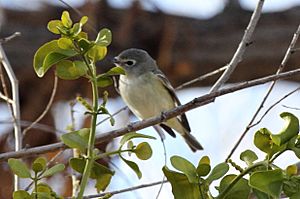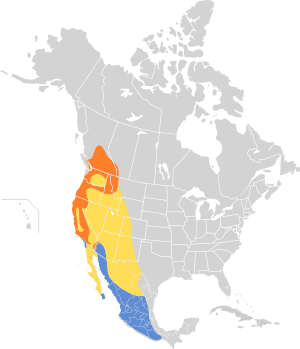Cassin's vireo facts for kids
Quick facts for kids Cassin's vireo |
|
|---|---|
 |
|
| Conservation status | |
| Scientific classification | |
| Genus: |
Vireo
|
| Species: |
cassinii
|
 |
|
The Cassin's vireo (pronounced "KASS-ins VEER-ee-oh") is a small songbird found in North America. These birds live in places like southern British Columbia in Canada and the western parts of the United States. When winter comes, they fly south to warmer areas like southern Arizona and Mexico.
Contents
What Does a Cassin's Vireo Look Like?
Cassin's vireos are small birds, usually about 11 to 14 centimeters (4 to 6 inches) long. They have a gray head, back, and sides. Their belly is a whitish color. One cool thing about them is their "spectacles" – these are solid white rings around their eyes that look like glasses! They also have white stripes on their wings called wing bars.
Their Song
These birds are known for their song, which they sing often. It sounds like short, rough whistles with several notes. Each phrase is usually about two seconds apart. The phrases often end on a high note and then a low note, almost like they are asking a question and then answering it.
Where Do Cassin's Vireos Live?
Cassin's vireos prefer to live in open woodlands found in the western mountains and foothills. You can usually spot them in the middle or lower parts of the forest trees. They move slowly and carefully as they look for food among the leaves.
Their Home and Family
When it's time to build a nest, Cassin's vireos create a cup-shaped nest. They make it from strips of bark and soft plant material. They usually build their nests in the fork of a small tree branch. A female vireo will lay 2 to 5 white eggs that have some brown spots.
Who Is John Cassin?
This vireo is named after a person named John Cassin. He was an ornithologist, which is a scientist who studies birds.
Relatives of the Cassin's Vireo
The Cassin's vireo used to be thought of as the same species as two other birds: the plumbeous vireo and the blue-headed vireo. All three of these birds were once called the "solitary vireo." Now, scientists know they are different species, but they are still closely related.


